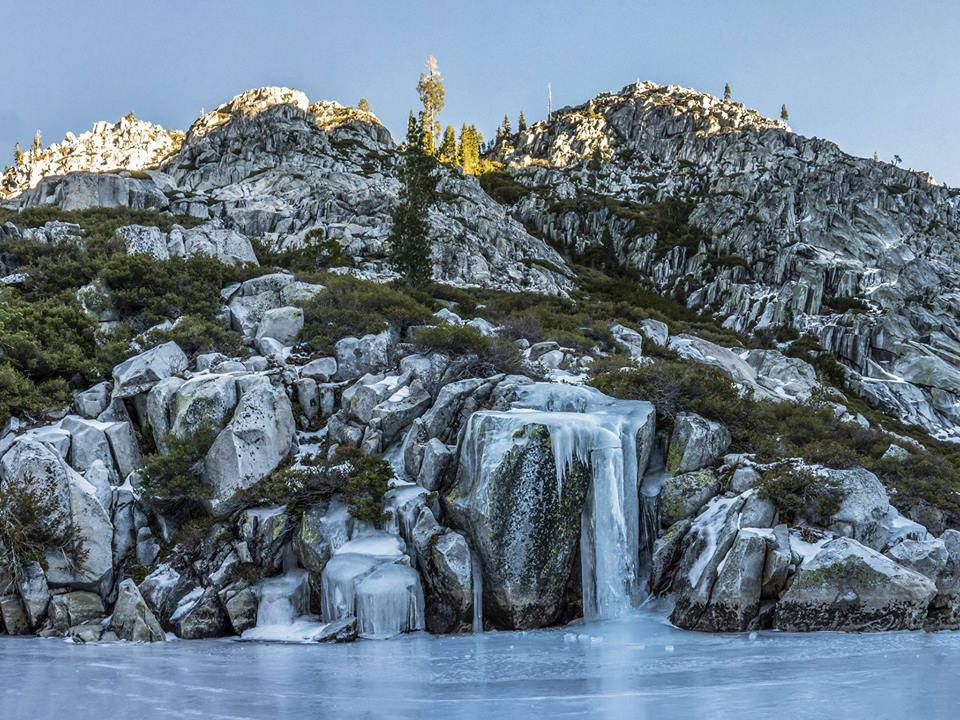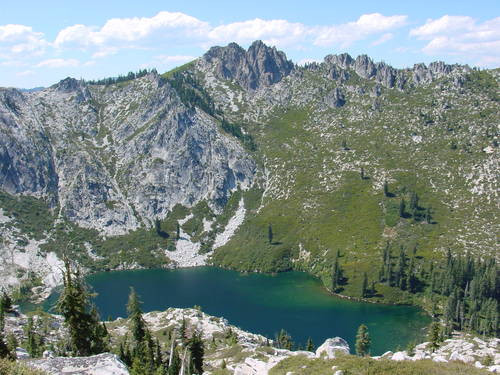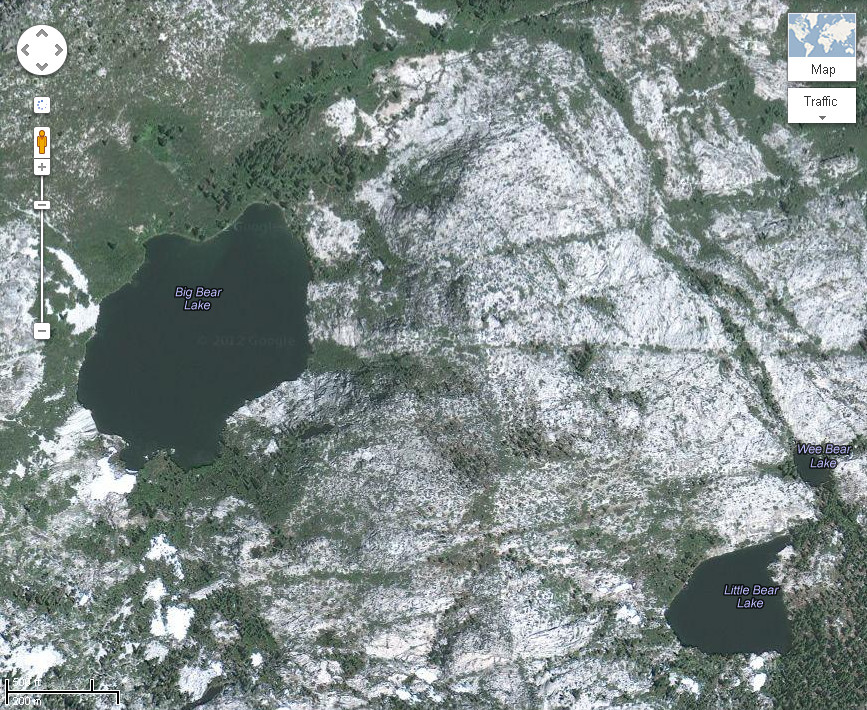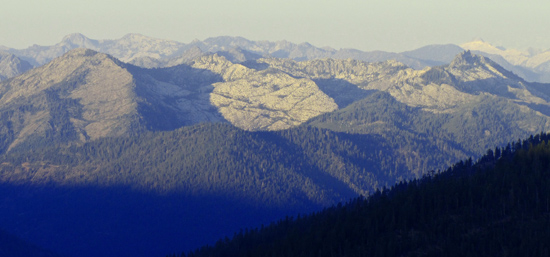— Alanis Obomsawin
The Bear Necessities
2013 was a year completely devoid of camping or backpacking. From that standpoint, it was a complete waste of time. It was a year of very hard work to try and transform a small, independent software association into a real company. My photographs of the Bear Lakes were cycling constantly as screen backgrounds on my computer, but I didn’t see them much because I was always covering them with windows of work.
2013 was also the year I finally and absolutely learned that money is toxic. It had poisoned my mind until I was willingly sacrificing my own life in an ignominious tribute to its spell on me. I realized with horror that I was trading nearly all my life’s present moments for money. In an effort to keep up with a rising tide of bills, I was working almost all my waking hours. This was atrocious, because what else do we truly have on earth but our lifetime? It is the only material thing of authentic value. I finally grasped that I was mortally locked in a financial deal with the devil, where I was giving away my time the way a drunken tourist loses money in Las Vegas. I was wagering more and more of my hours on the gaming table, trying in vain to win back what I had lost. But I was still losing, and there was no way to stop. I was all in.
The parasites of debts and bills had finally reached the point where they were killing the host. For many years they had tricked me into thinking that making more money was the answer to all my problems. Now I understood that money is the problem. It is a diabolical, insidiously abstract construct, that sucks the vitality and purpose out of human beings with the insatiable hunger of a tumor. It demands ever-increasing resources and devotion to its false, godlike consecration, while it indifferently robs the temple treasury and kills its own acolytes.
We humans worship money, and don’t realize it is the bane of our true purpose. We have made an insanely complex system that prevents the attainment of our highest goals. Where we should be devoted to the holy pursuit of God and Creation, we sinfully indulge in the pursuit of money. Most of the people on this planet spend the majority of their time thinking about how to get more money, when they should be thinking about how to get more God. Money has become the dominant object of worship for our species, and yet it doesn’t even exist in reality. We made it up ourselves! We used our God-given creative powers to fashion a false idol that is killing all of us – and our planet, too – as we continue to serve and expand its influence on us every day. Money is the highest evolutionary level of the golden calf.
Most everyone wants to make money and be successful. People want to achieve comfort and material wealth for themselves and their nearest family members. This is by far the dominant cultural and economic paradigm on earth. Nearly all of us strive to be defined as a “success” by the false criteria promulgated by this model. Yet we fail to appreciate the larger objective context from which the system derives. Our wealth and success depend on the very environment that we exploit to achieve our imaginary gains. We, and everything else on the earth, are the end products of an evolutionary system on a planetary scale. In a larger sense, we are the sprouting buds of universal outgrowth. By the combined efforts of billions of years of development, and the indefatigable benevolence of a higher consciousness than ours, we are already rich beyond our wildest dreams. It’s past time to cease our unnatural, rapacious exploitation of the very system from which our authentic wealth originates, and participate in the economic development of the natural world that sustains us.
Our goal must be to create a culture and economy in which the preservation and restoration of our planet’s natural resources are absolutely primary. Not just when it’s convenient to us, but all the time. We’ve tried it the other way for 10,000 years, and it’s not working! Pursuing the opposite agenda has already brought us to the brink of extinction. How do we make the shift from the bright and shiny external sources of power to the authentically austere and internal? In my own lifetime, I was aware of an outcry for environmental responsibility since I was a small boy. This peaked in our society before I got married, and since then it has been drowned out by a return to the usual human itinerary of avarice and aggression. Now, with the exponential growth of technology driving the evolutionary engine, we have become increasingly isolated from the natural world and from each other. The primary interactive forum for our society is a synthetic construct of gadgetry, sarcasm, consumerism, judgment, entertainment, and artificial intelligence. We delude ourselves into thinking our power is derived solely from a tenuous mastery of this illusory pretense.
What if our technology could help us to become as good as we can be? For example, instead of rewarding aggression and violence, video games could promote social and environmental skills. Television programs could demonstrate right behavior, and computers could create algorithms of benevolent action. The basic problem is that none of those optimal uses of technology would be “popular.” Which also means they wouldn’t be profitable, either. In fact, any enterprise with those objectives would very likely be a dismal failure. It’s not our system that’s dysfunctional; it’s our attitudes. We already have paradise, and we found it boring, so we became attracted to controversy and horror. Until we value harmony and conservation more than violence and greed, our synthetic environment will continue to reflect our values until it kills us.

The world is quite capable of existing without humans, but the reverse is not true. By the time humans became a force on the planet, the wilderness had already developed its own life systems to a level of perfection and abundance unparalleled in the known universe. Mountains and lakes formed magnificent vistas of splendor. Interdependent forests thickly carpeted the landscape with an organic recycling system. Boundless ocean laboratories teemed with a multitude of complex minerals and organisms. Then we came along, and instead of saying, “Look at this amazing system – I’m so happy to be a part of it,” we said, “How convenient that all this exists for our taking!” Why do we feel as though we have to take from nature, instead of communing with it? Why do we think that our selfish needs are more important than the numinous synergy of an interconnected whole? We act as if the world exists solely for our benefit! This is “just plain lazy,” as my mom would say.
We are like a foolish family that sells everything in its house so they can have a good time. Everything that formerly graced and adorned our abode was traded for money, so we could live it up. Soon, everything will be gone – right down to empty floors and bare walls. Then, in an effort to regain our former glory, we might start tearing up those floors, and selling the doors and windows for cash. Eventually, our only home will no longer be fit for living, and we’ll all be flat broke.
Our species used to live as part of the world. As our human self-centeredness grew, by degrees we became separated from nature until it was no longer the desired context. Our own fearful, greedy, aggressive interactions became the primary protocol that not only governed our relationships to each other, but also to the planet and all other living beings. It’s easy to be angry and destructive. It takes courage to be kind and nurturing. Our pernicious vanity prevents us from seeing beyond our self-imposed limitations. Being out in the wilderness strips away the bonds of feeling sorry for ourselves, and opens our hearts to the needs of other living things. Life is not just about us! There is a web of deep meaning that permeates all of creation, of which we are but one strand. Our ultimate happiness results from the wholeness of all that is; not the separation of the ego.
As a software designer, I benefit from a comprehensive awareness of how systems work. The systems I perceive in nature are infinitely more complex than any software that could be developed by humans. The interdependent, synchronous, and synergistic processes of the earth lie beyond our abilities to conceive – much less design – anything that behaves in such a harmonious arrangement. In contrast, as a species our propensity for programming destructive algorithms is a terrifying thing to contemplate! Can you imagine what would happen if we were put in charge of quality control for earth’s operating system? And yet, technology is evolving at a staggering exponential rate because of us. Soon we will produce an “artificial intelligence” more virile than our own. Are we merely technological embryos poised to develop into the next stage of our evolution? Or do we exist only for the purpose of enabling a greater intelligence than our own? It’s humbling to think that we might just be a “missing link” ourselves; a mere catalyst for a superior phylum that is destined to make us obsolete.
Everything in the universe evolves to more complexity, and money is no exception. By the start of 2014 I had woven a tangled web of too much debt, and not enough money, until I could hardly move. My financial picture looked like the back of my computer desk: a hopeless snarl of dusty wires so confusing I didn’t know which ones to plug or unplug anymore. As a touchstone to clarity, I kept thinking of “getting away from it all” for a few days in paradise, but that prospect became less and less likely as each day the tangles grew tighter and tighter.

By the summer, I was beginning to feel like I might never make it to the Bear Lakes that year, or perhaps ever again. My body was complaining about all the computer work and stress, with a plethora of small to moderate ailments. My knees were a perennial problem, but lack of exercise was really making them feel unreliable. I tore a groin muscle from lifting and pouring 5-gallon buckets of water during the drought, and it made moving around uncomfortable. From trying to favor the pain, my back soon went out from the same stupid buckets. Like those pails of water, I felt as if I was only half full. I still experienced shortness of breath from time to time, and general malaise and fatigue from sitting like a bump on a log for 8-10 hours a day to try and make enough money to pay off my debts. In typical stubborn fashion, I finally made up my mind to set aside a weekend in September by writing it in red ink on my calendar. This was the only way to get it done.
As usual, it was hard to find anyone to go with me, so I considered going again by myself. The thought was appealing: to try out “stealth camping” with minimal gear and supplies, or to fast entirely as a sort of “vision quest.” I was reading Sparrow Hart’s Letters to the River, and Black Elk Speaks, and was enamored with the idea of finding a new purpose for my life – even if it killed me! I have always become agitated and motivated when backed into a corner, and usually rebounded with a brash decision of some sort. This had always served me well in life, as there were many occasions when adversity required a bold and decisive response. However, when the adversity was caused by my own aging body, and the wear and tear of working nearly all of my waking hours, it seemed improbable that I could rally my rebellious bones for another backpacking trip.
Unknown to me, a seed had been planted years before, that was growing into an unexpected ally. Fifteen years had passed since Judy and I took our boys, Kevin and Logan, up to Little Bear Lake to initiate them in the ritual of backcountry camping. Since then, Logan made it clear he was not at all interested in strenuous outdoor activity, and Kevin had estranged himself from our family, due to conflict with his overbearing mother. I was also not very outgoing, owing to a surplus of work and lack of funds, amplified by the strange sense of isolation that is peculiar to our family. Owing to a sense of familial obligation, I reached out to Kevin a few times over the years, and we played a little golf together. It was during a round of golf in the early summer of 2014 that I learned Kevin had returned to Big Bear Lake the year before; all by himself! He had managed to find the trailhead by using Google Earth, locating the lakes, and retracing the satellite pictures of the trail to where it began next to Highway 3. What was even better was he wanted to go back, and soon… with me.
I had also been looking in on the lakes from the amazing vantage points provided by Google Earth. This was one of the coolest things about the Internet, which had exploded since I last visited the area with the boys, who were now young men. Using this stupendous viewing device, I could zoom in to a blurry but exciting overhead picture of every square meter of my beloved playground! Not just the lakes, but even individual rocks and trees could be recognized, which provided hours of wistful entertainment. That was my video game!

By July, I had a little bit of a scare while Joy was away on a trip. I was in the house alone, watching Rory McIlroy dominate the Open. I felt quite dizzy and short of breath for a while, but after a few hours I felt well enough to water the plants and sit down and type this. For about an hour, it felt like I was having a heart attack without the pain. Or at least the pain I had heard about; I have never actually felt it myself. I have a very high tolerance for physical or psychic pain, built up over years of suffering, and that sometimes makes it difficult to be an objective reporter. Sometimes it’s hard to distinguish the torment of psychological injuries from the anguish of bones and muscles.
The odd part was that I was in physical, but not psychic, distress, and did not feel even slightly motivated to call for help. Quite the opposite, I was thinking, “If I’m going to die, let it be here, and peaceful like this, instead of a trauma for anyone. Why do I want to call 911 and cause all that stress and drama? Why should I call Joy and freak her out, as much as I love her? This is as good a time as any to die.” So, I sat on the couch, propped up on pillows to try and catch my breath, and I couldn’t get enough oxygen. I hadn’t done anything more strenuous all day than letting the chickens out. My arms felt numb and tingly, as if they were asleep. Strangely, I felt no anxiety. It wasn’t dramatic, as if I was committing suicide, or looking forward to dying, but I was okay with passing away, really. Once I had this notion, I began to reason: “If I’m dying, is there anything I want to do last?” I got down the Bible, and a bottle of Hennessey’s Pure White Cognac that My son-in law, Dimari, and daughter Fiona, had generously brought to me from St. Thomas a few years before. I did not want to leave it untried. (I’m referring to the cognac.)
It was good.
I felt better after reading the book of Job, and gradually the sense of leaving faded away. It was the first time in my life I had felt like I was going through that door for real, and strangely enough, it was a good feeling.
“And once the storm is over, you won’t remember how you made it through, how you managed to survive. You won’t even be sure, whether the storm is really over. But one thing is certain. When you come out of the storm, you won’t be the same person who walked in. That’s what this storm’s all about.”
— Huraki Murakami

